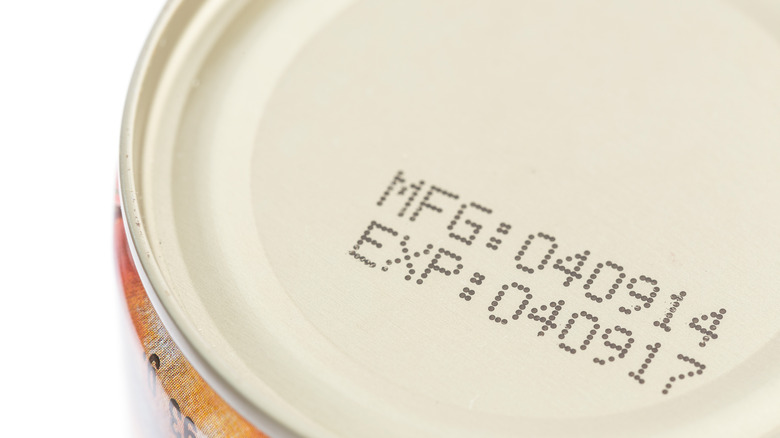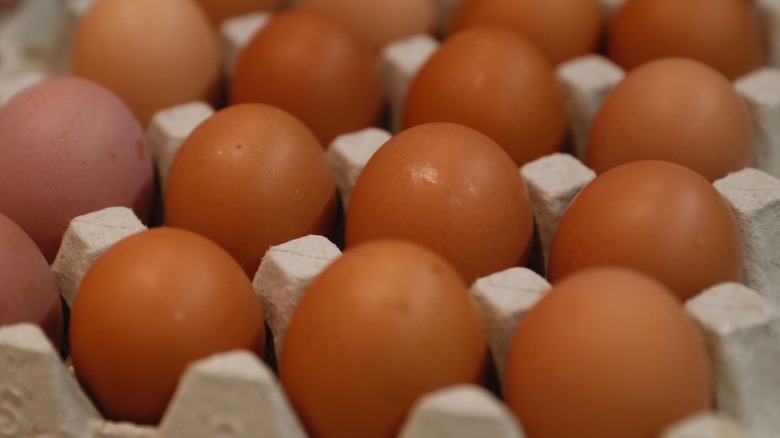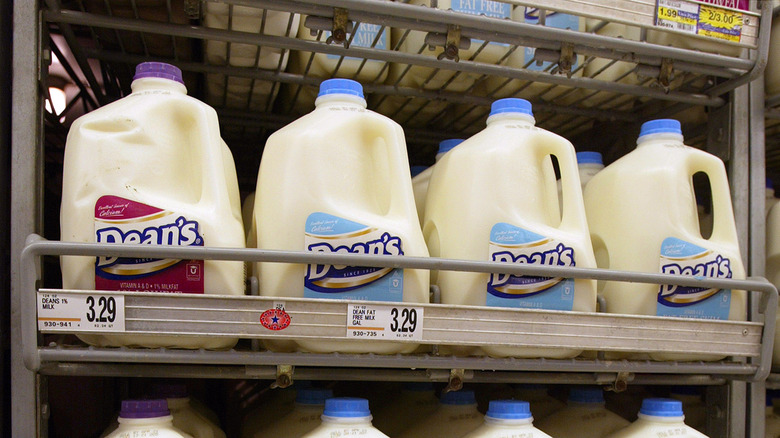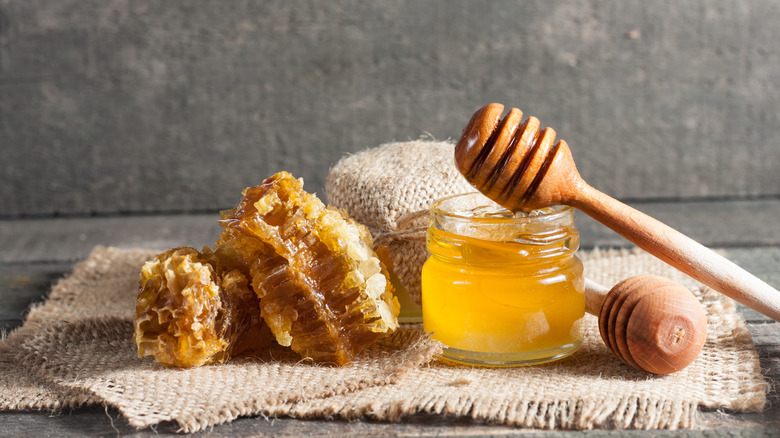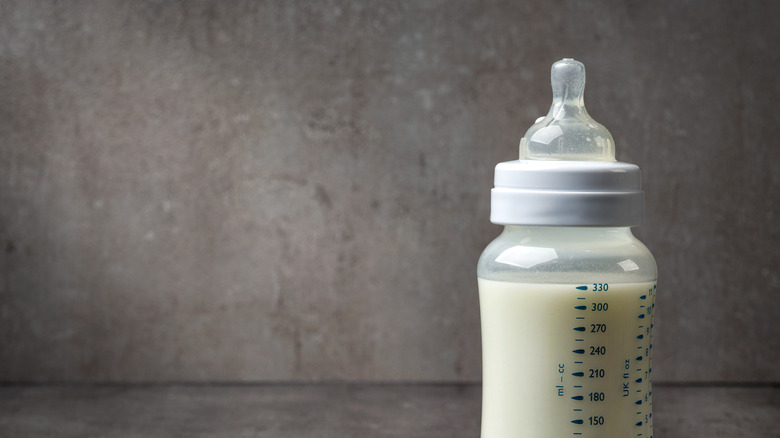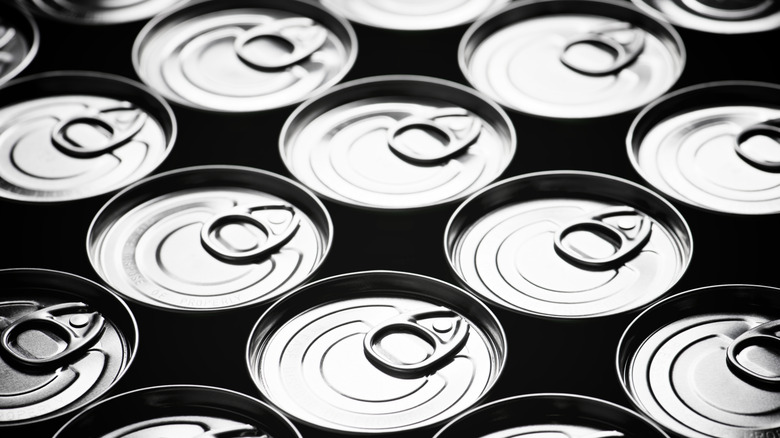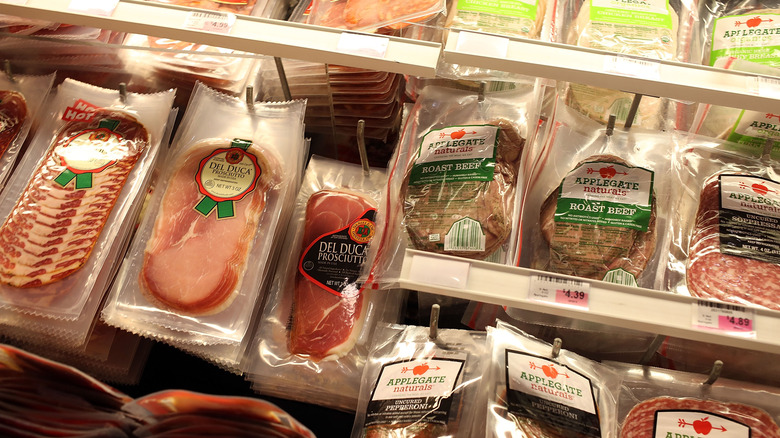Expiration Dates You Should And Shouldn't Pay Attention To
Thanks to modern preservation techniques and the widespread availability of refrigerators, food can last for quite a while. Since it can be tricky to know just how long food is good for, many items come marked with an expiration date. In many cases, however, that expiration date is just a guideline and the food can still be consumed after the expiration date has passed.
According to the Natural Resources Defense Council, 40 percent of food in America goes to waste, and a large reason for that is because most people are throwing out food that is still good.
While there are some expiration dates you should stick to, others can be viewed as loose guidelines. So how can you tell the difference? Here are some of the expiration dates you can totally disregard and some you should never ignore.
Eggs are often good past their expiration date
It can be hard to tell whether or not an egg is still safe to use unless you crack it, but chances are, it's still good for quite a while past its expiration date. You may have heard that old eggs immersed in water will float. This is true, but that doesn't necessarily mean the egg isn't safe to eat. Eggs are usually good for 3-5 weeks after you purchase them, but can last even longer if properly refrigerated.
The surest sign of a rotten egg is its smell. If you crack open an old egg and it gives off an unpleasant odor, then you should toss it (and the rest of the carton) into the trash.
Milk is usually OK after the sell-by date
Generally speaking, milk is good for up to a week after the sell-by date, although you should still give it a sniff test to be sure. If the milk smells funky, has changed color, or gotten thick and clumpy, pour it down the sink.
Keeping your milk properly refrigerated will help it last longer. This means that you should keep it on a shelf inside the fridge rather than storing it on the door, where it's exposed to temperature fluctuations.
Cheese usually lasts past the expiration date
The shelf life of cheese depends on the type of cheese, but they all tend to last beyond the expiration dates. With cheese, the appearance of the product is more important than the date on the packaging. While sprouting mold might seem like a pretty good sign that food should be thrown in the garbage, some cheeses (like brie) naturally grow white mold that's safe to eat. With the exception of blue cheeses, growths of orange, red, blue, or green mold are signs that your cheese has gone bad. In most cases, you can simply cut off the moldy part of the cheese and safely eat the rest.
Drier cheeses will usually last longer than moist cheeses. Be careful with pre-grated cheeses,as mold growing on grated cheese can't simply be cut off and you'll have to throw all of it away.
If the cheese looks and smells fine, it's probably safe to eat. The flavor of cheese intensifies over time, but that doesn't mean your cheese has gone bad. If, however, after taking a bite you begin to feel a tingling sensation in your mouth, spit it out because this means your cheese needs to be thrown out.
Raw meat has an expiration date for a reason
Raw meat is one thing you should definitely follow the expiration date on. Most meat, fish, and poultry should only be stored in the fridge for a couple of days, though thicker cuts of meat (such as a roast or a steak) can last for up to five.
If you're not planning on cooking these foods within the first few days after purchasing them, store them in the freezer. Most meats can last for months when frozen.
Honey lasts way past the expiration date if you store it right
Honey has a reputation as being a food that never spoils, so that expiration date doesn't carry too much weight. Since it has very little moisture, organisms can't live for very long in honey, which means it's very difficult for it to go bad.
That doesn't mean you can just leave an open jar of honey sitting out on your counter, though. In order for honey to remain unspoiled, it can't be exposed to moisture. To keep your honey fresh and sweet, seal it tightly and store it in a cool, dry place.
Some juice will last past the expiration date
Those fruit juices probably last a longer than you think. Fruit juices are usually acidic, which means it's harder for bacteria to form in them. This means fresh fruit juice is usually good past the expiration date. Vegetable juice, however, is more likely to go bad around the expiration date, although it may last longer if it's blended with fruit juice.
Juices that aren't made from fresh fruit usually have a lot of added sugar, which acts as a preservative. While fresh apple cider will only stay good for a week or so after the expiration date, bottled apple juice can stay good for up to three months. Juice that has gone bad will usually smell sour or grow mold.
Always pay attention to expiration dates on infant formula
Infant formula is the only food that is federally regulated and required to carry a use-by date by the Food and Drug Administration. This is one expiration date that is absolutely vital to adhere to, especially since your baby can't tell you if the formula tastes off.
Stick to the date printed on the packaging, and make sure to use it within 24 hours after opening, or according to the manufacturer's instructions. Also make sure to follow the storage instructions to ensure freshness. Infant formula needs to be stored in a cool, dark place with a stable temperature.
Pay no attention to expiration dates on most canned goods
While canned goods do often have expiration dates printed on them, you don't need to follow them. While some acidic foods, such as canned tomatoes, are only good for a year and a half, most canned goods (even meats) can last for years.
For the best results, store canned goods in a cool, dry place. Keeping them in a warm environment will diminish their lifespan and also affect the quality of the food whenever you finally eat it.
Most pasta is good after the expiration date
The shelf-life of pasta depends on how it's made, but that boxed stuff you buy at the store lasts for quite a while past the date on the packaging.
If you're storing fresh, homemade pasta, it'll only remain good for four or five days since it's made with eggs.
Dried pasta, on the other hand, is not usually made with eggs and therefore can last for one to two years past the expiration date. Dry pasta will last longer if kept in its original packaging, or if stored in a tightly-closed container to keep out air.
Bread might keep past the expiration date
Bread is another one of those foods where the appearance matters a lot more than the date on the packaging. Bread is usually safe to eat as long as you don't see any mold growing on it, so if it looks good, have at it.
While most people store bread at room temperature, refrigerating it will lengthen its lifespan. While this does run the risk of drying out the bread, the bread will still be edible. You can also freeze bread for a few months. If you prefer to keep your bread stored in the pantry, it should remain good for five to seven days.
Yogurt is probably fine after the expiration date
If you like yogurt, you know the expiration dates on the package don't give you much time to eat it. We've got good news though — you don't have to toss it just because you've the date on the lid.
The shelf life of yogurt depends on whether or not the package has been opened. If the yogurt has remained sealed, it can still be good for one to two weeks after the printed expiration date, as long as it's been stored in the fridge.
Opened yogurt should be eaten within five to seven days for the best quality, though it will likely still be good after that. Watch out for any mold growth, as this is a sign the yogurt has gone bad. Also discard it if it has been left out at room temperature for more than two hours.
Deli meat expiration dates should definitely be followed
Deli meat is one of those foods you should always play it safe with since it can carry listeria which grows even in cold temperatures. While deli meat may still seem good after the expiration date, you shouldn't take the risk.
A tell-tale sign that deli meat has gone bad is if it seems slimy. As always, keep your nose out for strange smells that could indicate the food is spoiled. If it seems slimy or smells off before even before the expiration date, don't eat it.
Ice cream can be used past the expiration date... sometimes
Whether or not you need to pay attention to the expiration date on your ice cream just depends on whether or not it's been opened.
Ice cream might seem like it should last for a long time because it's frozen, but bacteria growth isn't stopped in the cold, it's just slowed down. Each time ice cream is exposed to the air and begins to thaw, bacteria grows. Unopened ice cream can be stored for three to four months and opened ice cream is generally good for one to two months. Of course, freezer burn will likely set in before that, so even if your ice cream is safe to eat, you might not like the taste.
Beer is best before the expiration date
Beer, unlike wine, does not improve with age. That best by date on your six pack is there for a reason.
Beer is at peak freshness within the first few months of bottling. After that, the flavor of most beers starts to break down, although some beers, especially those with a higher alcohol content, can be aged for a longer time. Drinking old beer won't actually hurt you, but the flavor will be far from appetizing.
Leftover food expires pretty quickly
Leftover food isn't usually marked with expiration dates, but it should be eaten pretty quickly. Make sure to put any leftovers in the refrigerator as soon as possible; the safest length of time they can stay at room temperature is two hours.
Refrigerating the food slows down the growth of bacteria, so it's safe to eat leftovers the next day, but don't wait too long. Leftover foods are only good for about two to three days, after which they should be thrown out.
